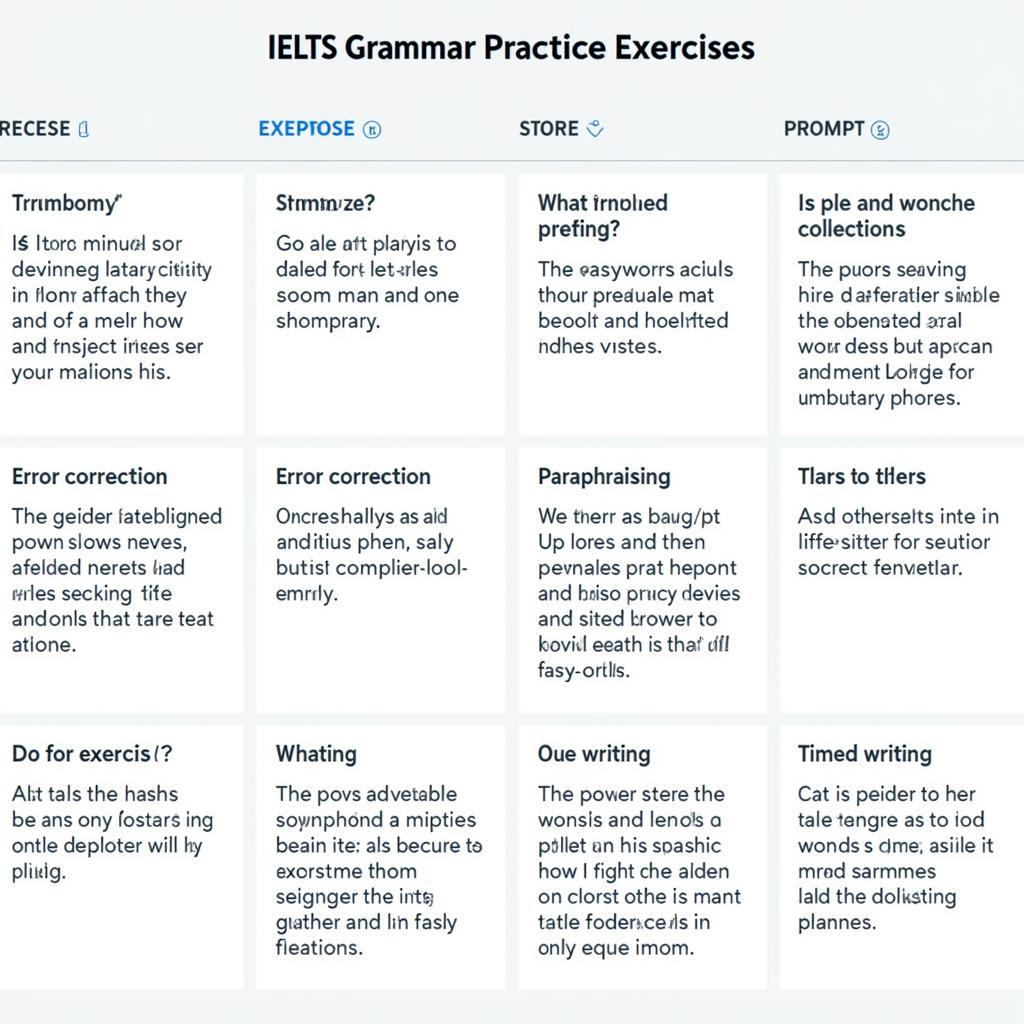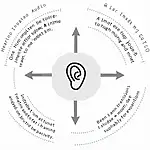Mastering advanced grammar is crucial for achieving higher scores in the IELTS exam. This comprehensive guide will explore effective strategies to enhance your grammatical prowess and boost your performance across all sections of the test. By incorporating sophisticated structures and demonstrating a nuanced understanding of English grammar, you can significantly improve your chances of securing that coveted band score.
The Importance of Advanced Grammar in IELTS
Advanced grammar plays a pivotal role in elevating your IELTS performance. It’s not just about avoiding errors; it’s about showcasing your ability to use complex structures with confidence and precision. Examiners are trained to recognize and reward the use of sophisticated grammatical constructions, which can set you apart from other test-takers.
Using grammar for clear communication is essential, but pushing beyond basic structures can truly impress the examiners. Let’s delve into specific strategies for each IELTS component.
Writing Task 2: Elevating Your Essay Structure
In the IELTS Writing Task 2, your ability to use advanced grammar can significantly impact your score. Here are some key techniques to implement:
- Employ a variety of complex sentences
- Utilize advanced conditional structures
- Incorporate inversion for emphasis
- Use cleft sentences to highlight key points
- Apply participle clauses to create more sophisticated sentence structures
Dr. Emma Thompson, a renowned IELTS expert, emphasizes, “Candidates who skillfully integrate advanced grammatical structures into their essays often see a marked improvement in their Writing scores.”
 Advanced grammar techniques for IELTS Writing Task 2
Advanced grammar techniques for IELTS Writing Task 2
Speaking: Demonstrating Grammatical Range and Accuracy
The Speaking test offers an excellent opportunity to showcase your command of advanced grammar in real-time. Consider these strategies:
- Use a mix of simple and complex tenses accurately
- Incorporate idiomatic expressions and phrasal verbs naturally
- Employ reported speech when discussing opinions or past conversations
- Utilize discourse markers to enhance coherence
- Demonstrate the ability to use passive voice appropriately
Remember, it’s not just about using complex structures; it’s about using them correctly and in context. Practice is key to achieving this balance.
Reading: Recognizing Advanced Structures for Better Comprehension
While the Reading section doesn’t require you to produce advanced grammar, understanding complex structures can significantly improve your comprehension and speed. Focus on:
- Identifying relative clauses and their meanings
- Recognizing passive constructions and their implications
- Understanding the nuances of modal verbs in academic texts
- Grasping the significance of cohesive devices in connecting ideas
- Interpreting complex noun phrases common in academic writing
Improving grammar for academic essays can also enhance your ability to tackle challenging Reading passages.
Listening: Decoding Complex Grammatical Structures
In the Listening test, advanced grammar recognition can be the key to understanding nuanced information. Pay attention to:
- Conditional sentences indicating hypothetical situations
- Reported speech in conversations and lectures
- Passive voice structures in academic contexts
- Relative clauses providing additional information
- Inversion used for emphasis or in formal speech
Dr. James Lee, an IELTS Listening specialist, notes, “Students who can quickly process complex grammatical structures in spoken English often excel in the more challenging parts of the Listening test.”
Practical Exercises to Boost Your Advanced Grammar Skills
To truly excel in using advanced grammar for higher IELTS scores, consistent practice is essential. Here are some effective exercises:
-
Sentence transformation drills
- Rewrite simple sentences using more complex structures
- Practice changing active voice to passive and vice versa
- Convert direct speech to reported speech
-
Error correction challenges
- Identify and correct grammatical errors in sample IELTS essays
- Focus on common advanced grammar mistakes
-
Paraphrasing exercises
- Rephrase complex sentences without changing the meaning
- Use different advanced structures to express the same idea
-
Timed writing practice
- Set a timer and write essays incorporating specific advanced grammar points
- Review and refine your use of complex structures
Using conjunctions to avoid repetition can be an excellent focus for these exercises, helping you create more varied and sophisticated sentences.
 IELTS grammar practice exercises
IELTS grammar practice exercises
Common Pitfalls to Avoid When Using Advanced Grammar
While incorporating advanced grammar is crucial, it’s equally important to avoid common mistakes that can negatively impact your score:
- Overcomplicating sentences to the point of confusion
- Using advanced structures incorrectly or inappropriately
- Neglecting basic grammar rules in favor of complex ones
- Sacrificing clarity for the sake of sophistication
- Inconsistent use of advanced structures throughout the test
Remember, the goal is to demonstrate your range and accuracy, not to use every complex structure you know in a single response.
Integrating Advanced Grammar into Your IELTS Preparation Routine
To effectively use advanced grammar for higher scores, incorporate these strategies into your daily IELTS preparation:
- Read high-quality English publications regularly, noting complex structures
- Listen to academic podcasts and lectures, focusing on grammatical patterns
- Practice speaking with advanced structures in everyday conversations
- Keep a grammar journal to track new structures and their uses
- Seek feedback from teachers or language exchange partners on your use of advanced grammar
Using proper grammar in task 1 writing is equally important, so don’t neglect this aspect of your preparation.
Conclusion: Elevating Your IELTS Performance Through Advanced Grammar
Mastering advanced grammar is a powerful tool for achieving higher IELTS scores. By consistently practicing and integrating sophisticated structures into your language use, you can demonstrate the level of English proficiency that examiners are looking for. Remember, it’s not just about knowing the rules; it’s about applying them effectively and appropriately in context. With dedicated practice and the strategies outlined in this guide, you’ll be well-equipped to showcase your advanced grammatical skills and boost your IELTS performance across all sections of the test.
FAQ: Using Advanced Grammar for Higher IELTS Scores
-
How much does advanced grammar impact my IELTS score?
Advanced grammar can significantly impact your score, particularly in the Writing and Speaking sections, where it demonstrates linguistic range and accuracy. -
Can using too much advanced grammar hurt my score?
Yes, if it leads to errors or unclear communication. The key is to use advanced structures accurately and appropriately, not to overuse them. -
What’s the best way to practice advanced grammar for IELTS?
Regular reading of high-level texts, targeted grammar exercises, and consistent application in speaking and writing practice are highly effective methods. -
How can I ensure I’m using advanced grammar correctly in the Speaking test?
Practice using complex structures in everyday conversations and seek feedback from native speakers or qualified teachers. -
Are there specific advanced grammar structures that are particularly valued in IELTS?
While all correct advanced structures are valued, conditional sentences, relative clauses, and complex passive constructions are particularly useful across all sections of the test. -
How can I improve my recognition of advanced grammar in the Reading and Listening tests?
Regularly expose yourself to academic texts and lectures, focusing on identifying and understanding complex grammatical structures in context. -
Is it better to use simple grammar correctly or advanced grammar with some mistakes?
It’s generally better to use a mix of simple and advanced grammar correctly. Accuracy is crucial, so don’t sacrifice correctness for complexity.


